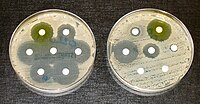
Photo from wikipedia
The increasing prevalence of antibiotic resistance has become a global health crisis. For the purpose of safety regulation, it is of high importance to identify antibiotic resistance genes (ARGs) in… Click to show full abstract
The increasing prevalence of antibiotic resistance has become a global health crisis. For the purpose of safety regulation, it is of high importance to identify antibiotic resistance genes (ARGs) in bacteria. Although culture-based methods can identify ARGs relatively more accurately, the identifying process is time-consuming and specialized knowledge is required. With the rapid development of whole genome sequencing technology, researchers attempt to identify ARGs by computing sequence similarity from public databases. However, these computational methods might fail to detect ARGs due to the low sequence identity to known ARGs. Moreover, existing methods cannot effectively address the issue of multidrug resistance prediction for ARGs, which is a great challenge to clinical treatments. To address the challenges, we propose an end-to-end multi-label learning framework for predicting ARGs. More specifically, the task of ARGs prediction is modeled as a problem of multi-label learning, and a deep neural network-based end-to-end framework is proposed, in which a specific loss function is introduced to employ the advantage of multi-label learning for ARGs prediction. In addition, a dual-view modeling mechanism is employed to make full use of the semantic associations among two views of ARGs, i.e. sequence-based information and structure-based information. Extensive experiments are conducted on publicly available data, and experimental results demonstrate the effectiveness of the proposed framework on the task of ARGs prediction.
Journal Title: Briefings in bioinformatics
Year Published: 2022
Link to full text (if available)
Share on Social Media: Sign Up to like & get
recommendations!